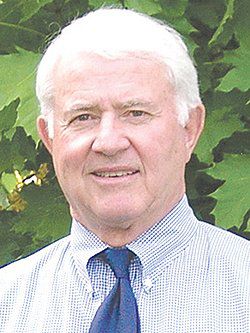For years, there has been an ongoing discussion about the best method for selecting the people who make up the state board of education. This year is no exception. There are three options under discussion; (1) Partisan elections (2) Non-partisan elections and (3) Appointment by the governor with confirmation by the Senate. I think most of our citizenry prefer not to mix politics and school governance. Our local school boards are elected in non-partisan races, but the districts are small enough that most of us are readily acquainted with candidates. That is not true in the State School Board races. Several decades ago Utah shifted governance of higher education to a board of regents appointed by the governor. By law, the board has a political balance. I had the privilege of serving on the board for a time and was always impressed with the caliber of my associates and the absence of politics or rancor. It has worked extremely well. The appointees are outstanding citizens. This is a model worthy of consideration for the state school board. I will keep you posted as the issue unfolds.
As promised, I report back on the “right to try,” the bill allowing terminally ill patients to try drugs not yet approved by the FDA. The bill passed out of the House Committee with near unanimous support.
I think we are heading for some increase in the gas tax. There are a couple different proposals. Whatever we do, the rural legislators will attempt to secure commitments to spend more on roads throughout the state and a little less on the Wasatch Front.
It is a major challenge to apportion funding among the various higher education institutions. This year, we will allocate some money based on how successful the various institutions are in retaining students through graduation or transfer to a four-year institution. Snow College and Southern Utah University received high marks on these two fronts.
When we entered the down turn in 2007-2008 we had substantial money in our general rainy day and education rainy day funds. I consider it likely that we will make a solid effort to increase those funds to the end that we will be well prepared should we experience troubled times again.
Most readers will be aware of the effort to reduce discrimination against the gay community in housing and employment while at the same time protecting religious freedom. It is a delicate, but important balance that I hope we can achieve.
The rural legislators meet every Thursday afternoon with the rural school superintendants. Conflicting obligations sometimes require that we flow in and out of the meeting, but it is a very valuable interchange. These outstanding men and women do a great job for our rural schools. School funding remains under discussion but it is my fond hope that it will receive a substantial bump. Those who devote their careers to teaching our children deserve not only our appreciation, but also our financial support.
One of the lessons learned in the legislative arena is that sometimes, public policy is years in the making. An idea advanced before its time will be rejected and may surface multiple times until the climate is right. Such is true with the wearing of seat belts! The subject has surfaced many times during my years of service. For the first time it appears the legislature is prepared to make it a primary offense rather than a secondary offense dependent upon the vehicle being stopped for another reason. The vote was close in the House, but it passed. It looks like we will all need to “buckle up.”
The House initially rejected the creating of a committee to study the low voter turnout in public elections. It is now being reconsidered and I think will pass. During most of my life, Election Day was “an important event.” Maybe we have watered it down in our effort to make it easy. We seem to be less focused on this important citizen duty.
Here are some questions we must confront: Are we imposing too many “testing obligations” in public schools? Does the effort to transfer public lands to the states have a realistic chance of succeeding? Where is the right balance between religious freedom and the rights of the gay community when the two collide? How far should we go in the health care reform, and how much of the state budget should we spend so no one falls through the cracks? The impoverished are currently covered, as are those who can afford health care insurance. It is the group in the middle that could be left behind. That is unacceptable to me.
During the week we received reports from Senators Hatch and Lee, and Representatives Bishop and Love. They are all solid human beings committed to the difficult task of trying to reign in an out of control federal government. That is no small task.
Clean air continues to be a subject of discussion, though this winter the air has been unusually clean. We are discussing a $20 million appropriation to replace diesel-powered buses with buses that rely on alternative fuel sources. Actual funding decisions will not be made until late in the session.
Utah remains a leader on the national scene, and its governor Gary Herbert, will shortly take over as chairman of the National Governors Association. All in all, Utah is a great place to live. Its leaders at every level tend to reflect the caliber of the general populace, which is pretty solid.
Utah Legislative update: Rep. Kay McIff

"Rep. Kay McIff"
